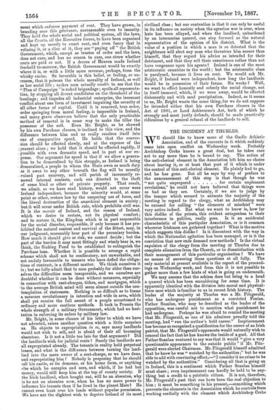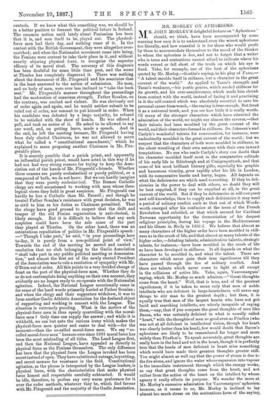THE INCIDENT AT THURLES.
WE should like to know more of the Gaelic Athletic Association, and of the currents in it which suddenly came into open conflict on Wednesday week. Probably Archbishop Croke knows a great deal, but he takes care not to say more than he is bound to say. The action of the anti-clerical element in the Association left him no choice about leaving it, or at least that part of it which is under the control of this anti-clerical element. He plainly had to go, and he has gone. But all he says by way of preface to the announcement of this step is that though he was
"not quite unprepared for certain unpleasant revelations," he could not have believed that things were as bad as they are. Certainly, if we are to judge by the temper which seemed to animate the majority of the meeting in regard to the clergy, what an Archbishop may be excused for calling " the elements of mischief " were very active indeed. But what we want to know is, how far this dislike of the priests, this evident antagonism to their interference in politics, really goes. Is it an accidental characteristic of this partigular Association, or is it common wherever Irishmen are gathered together? What is the motive which suggests this dislike? Is it discontent with the way in which the Nationalist agitation has been managed, or is it the conviction that new ends demand new methods ? Is the virtual expulsion of the clergy from the meeting at Thurles due to complete alienation from the Church, or to dissatisfaction with their management of this particular organisation ? We have no means of answering these questions at all fully. The only material at present available is the report of the proceed- ings on Wednesday week, and from this it is not possible to gather more than a few hints of what is going on underneath.
We may assume that the schism does but bring to a head a quarrel which has been smouldering for some time. It is apparently identical with the division into moral and physical- force men which is familiar to us in recent Irish history. The leader of the majority at Thurles was a Mr. Fitzgerald, who has undergone punishment as a convicted Fenian. Father Scanlan, who may be described as the leader of the opposition, was careful not to mention what punishment he had undergone. Perhaps he was afraid to remind the meeting that Mr. Fitzgerald, as one of his admirers proudly told the meeting, had " run the outlaw's bold career." Imprisonment has become so recognised a qualification for the career of an Irish patriot, that Mr. Fitzgerald's opponents would naturally wish to conceal the fact that he has known the inside of a gaol. All that Father Scanlan ventured to say was that it would " give a very questionable appearance to the outside public " if Mr. Fitz- gerald were elected Chairman. Mr. Fitzgerald himself admitted that he knew he was " watched by the authorities ;" but he was able to add with convincing effect,—"I consider it no crime to be watched by the authorities." Considering all that is going on in Ireland, this is a sentiment which Father Scanlan himself must share ; even imprisonment can hardly be held to be any- thing but a credit to a patriotic citizen. It is not, therefore, Mr. Fitzgerald's past that can have been the real objection to him ; it must be something in his present,—something which prevents the elements in the Association which he controls from working cordially with the element which Archbishop Croke controls. If we knew what this something was, we should be in a better position to forecast the political future in Ireland. The common notion until lately about Fenianism has been that it is, and sees itself to be, played out. The physical- force men had their day, and nothing came of it. In the contest with the British Government, they were altogether over- matched; and when the Nationalist movement came into being, the Penises were content to take their place in it, and without exactly abjuring physical force, to recognise the superior efficacy of its moral rival. The accuracy of this diagnosis has been doubtful for some little time past, and the scene at Thurles has completely disproved it. There was nothing about the demeanour of Mr. Fitzgerald and his associates that in the least answered to the notion of submission. No man, and no body of men, were ever less inclined to " take the back seat." Mr. Fitzgerald's manner throughout the proceedings had the moderation of conscious strength. Father Scanlan, on the contrary, was excited and violent. He was obviously out of order again and again, and he would neither submit to be ruled out of order, nor consent to put himself in order. When his candidate was defeated by a large majority, he refused to be satisfied with the show of hands. He was offered a poll, and took no notice of it. He asked to be allowed to say one word, and, on getting leave, made a speech. And in the end, he left the meeting because, Mr. Fitzgerald having been duly elected Chairman, he was not allowed to move what he called a " constitutional amendment," which he explained to mean proposing another Chairman in Mr. Fitz- gerald's place.
It is scarcely possible that a parish priest, and apparently an influential parish priest, would have acted in this way if he had not had very strong reasons for trying to keep the Asso- ciation out of the hands of Mr. Fitzgerald's friends. Whether these reasons are purely ecclesiastical or purely political, or a compound of both, we do not know. But we can hardly imagine that they were purely ecclesiastical. The Roman Catholic clergy are well accustomed to working with men whose theo- logical views they hold in great suspicion. Mr. Fitzgerald can hardly be less a Catholic than Mr. Parnell ; and though he treated Father Scanlan's resistance with great decision, he was as civil to him as his duties as Chairman permitted. That the clergy have good ground to suspect that the drift and temper of the old Fenian organisation is anti-clerical, is likely enough. But it is difficult to believe that any such suspicion could have been the sole cause of the part they played at Thurles. On the other hand, there was an ostentatious repudiation of politics in Mr. Fitzgerald's speech : —" Though I take part," he said, "in your proceedings here to-day, it is purely from a non-political point of view." Towards the end of the meeting he moved and carried a resolution that no club belonging to the Gaelic Association " shall take part in any public political meeting or demonstra- tion," and almost the first act of the newly elected President of the Association was to rule a resolution of sympathy with Mr. O'Brien out of order. All this points to a very decided change of front on the part of the physical-force men. Whether they do or do not contemplate doing anything on their own account, they evidently are no longer ready to co-operate with the Nationalist agitation. Indeed, the National League occasionally came in for some of the hard words primarily hurled at Father Scanlan ; and when the clergy and their supporters withdrew, it was to form another Gaelic Athletic Association for the declared object of supporting and working in concert with the League. The situation is extremely puzzling. What is the motive of the physical-force men in thus openly quarrelling with the moral- force men ? Only time can supply the answer ; and while it is withheld, we can but note the curious irony which makes the physical-force men quieter and easier to deal with—for the moment—than the so-called moral-force men. We say "so- called moral-force men " because ever since 1881 moral force has been the most misleading of all titles. The Land League first, and then the National League, have appealed as directly to physical force as the Fenians themselves. The only difference has been that the physical force the League invoked has been secret instead of open. They have substituted outrage, boycotting, and secret menace for resistance in the field. Constitutional agitation, as the phrase is interpreted by the League leaders, is physical force, with the characteristics that make physical force honest and respectable carefully subtracted. It would be idle, therefore, to profess any very warm preference for it over the ruder methods, whatever they be, which find favour with Mr. Fitzgerald and the majority of the Gaelic Association.
























































 Previous page
Previous page